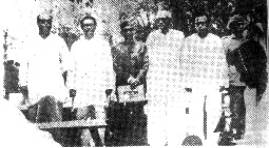| Home Introduction Bengali Literature Early History Islam in Bengal British Colony British Rule Sepoy (Soldiers) Rebellion in 1857 British Policy Muslim Nationalist movement Division of Bangla Muslim League Two Nations Concept Pakistan Period Political Discrimination Military Discrimination Language Movement Revolution of Ayub Khan Six Points Agartala Conspiracy Case Students 11 points Ayub Resigned & Yahya Came to Power General Election in 1970 Liberation War Declaration of Independent Government Formation Freedom Fighters Youth Spirit Surrender Genocide Atrocity Against Women How Many Died Criminals Photo Collections Links About Me (Resume) |
West Pakistani forces arrested Sheikh Mujibur Rahman, the leader
of the pro-Bangladesh Awami League party who was elected as a Prime
Minister in pakistan, soon after midnight on March 26, 1971. This led to
a general fear of the Pakistani army would order further arrests or even
killings, and many of the East Pakistani (Bengali) parliament members
fled to India. It was from Agartala, India, that these elected officials
took the initiative to form the first cabinet for the government of
Bangladesh. The next day, the Shadhin Bangla Betar Kendra (Free Bangladesh
RadioStation) aired a statement made by Tajuddin Ahmed announcing the
formation of this cabinet. The still-arrested Sheikh Mujib was
unanimously chosen as the new president of Bangladesh. Since Mujib was
absent, Syed Najrul Islam was to assume the position of Acting
President.
The first Cabinet was, then, composed of the following leaders:
Syed
Najrul Islam, as Acting President
Tajuddin
Ahmed, as Prime Minister Mostaque
Ahmed, in charge of the ministry of Foreign Affairs A.
H. M. Kamruzzaman, as Home Minister M.
Mansur Ali, as the Finance Minister The Secretariat of the Government was as follows:
After this government was formed, letters were sent out to
various countries asking for support in the people's fight for an
independent Bangladesh. On April 17th, Tajuddin Ahmed, Syed
Najrul Islam, Colonel M. A. G. Osmani (who at this time assumed the
position of Commander-in-Chief of the Bangladesh Forces), and many other
political leaders arrived at the mango grove ("Aamtola") in
the town of Boiddonathtola, in the western district of Kusthia near the
Indian border. (Incidentally, the town of Boiddonathtola was later
renamed "Mujibnagar" after our first president.) There, in front of locals and many international journalists, the
inauguration of the People's Republic of Bangladesh was held. The new
flag was raised, and the newly adopted national anthem - Tagore's
“Amaar Shonar Bangla Ami tumaye Bhalobashi…” - was played.
Professor Yusuf Ali, a Member of Parliament, read the Proclamation of
Independence. On April 18th 1971, at 12:41pm, Mr. Hossain Ali, the Bengali
Deputy High Commissioner of Pakistan, in Calcutta, India, along with 70
others, officially raised the flag of Bangladesh and pledged their
allegiance to the Government of Bangladesh. First Secretary Mr. Rafiqul
Islam Chowdhury, Third Secretary Mr. Anwarul Karim Chowdhury and
Assistant Press Attache M. Moqshed Ali were also present in that
ceremony and were working tirelessly for generating support for the
independence of Bangladesh. The role of Mr. Hossain Ali is very
important, since he pioneered the way for other expatriate Bengali
diplomats to pledge their allegiance to Bangladesh Government. On the 21st of April, Justice Abu Syed Chowdhury was appointed as
representative for The Government of Bangladesh diplomatic mission, and
travelled officially to the United Nations and many other countries.
|

